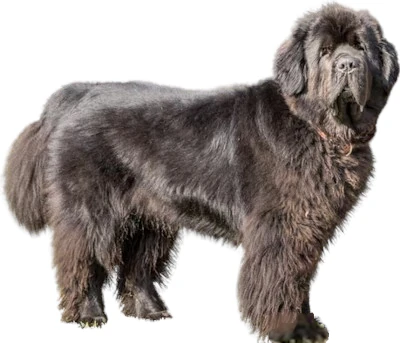
The Newfoundland is a large dog breed originating from the island of Newfoundland in Canada. This breed is renowned for its strength, intelligence, and gentle temperament. The Newfoundland is especially known for its exceptional abilities in water rescue, where its protective instincts and natural talents make it indispensable.
The Newfoundland is a massive and powerful dog. Males can reach a height of 71 cm at the withers and weigh up to 70 kg, while females average 66 cm and weigh around 55 kg. It has a heavy bone structure, developed muscles, and a thick, water-resistant coat, making it particularly suited for aquatic environments.
The Newfoundland's coat is dense and water-resistant. It consists of a soft undercoat and a longer, coarser outer layer. The coat colors can be black, brown, or white with black markings. Regular brushing is necessary to avoid matting and keep the skin and coat healthy, especially during shedding season.
Male Newfoundlands typically measure between 69 and 71 cm at the withers and weigh between 60 and 70 kg. Females, slightly smaller, measure between 66 and 68 cm and usually weigh between 50 and 55 kg. Their large size is an asset for tasks such as working and rescue operations.
The Newfoundland is known for its affectionate, patient, and calm temperament. This dog is gentle with children and sociable with other animals. Its high intelligence makes it easy to train, though it is essential to start training from a young age to properly channel its strength and energy. Protective and devoted to its family, it excels in rescue situations, particularly in aquatic environments.
The Newfoundland is a robust breed, but it is prone to certain genetic conditions such as hip dysplasia, heart issues, and gastric torsions. Regular veterinary check-ups, a balanced diet, and moderate exercise are essential to maintaining its health. Its life expectancy is about 8 to 10 years.

The Newfoundland Puppy is a large, sturdy, and powerful dog originally from Canada. Known for its calm and gentle temperament, this dog makes an excellent companion for families. Despite its large size, it is generally very affectionate and patient, especially with children. The Newfoundland is also famous for its exceptional swimming skills and rescue abilities, thanks to its webbed paws and great endurance in the water. It is a working dog, often used in rescue missions at sea or as a service dog. Intelligent and easy to train, the Newfoundland can sometimes be a little stubborn. Its dense, water-resistant coat requires regular grooming, especially during shedding seasons.
The price of a Newfoundland Puppy varies depending on the breeder, pedigree, and health specifications. On average, you should expect to budget around 1,500 euros.
The Newfoundland is a giant dog breed known for its gentleness, patience, and rescue instincts. Training a Newfoundland requires patience and an understanding of its specific needs.
Early Socialization: Socialization is essential for the Newfoundland. Expose it to various environments, people, and animals from an early age to foster balanced and confident behavior.
Positive Reinforcement: Use positive reinforcement methods to encourage desired behaviors. Food rewards and verbal praise are particularly effective with this breed.
Exercise and Mental Stimulation: The Newfoundland needs plenty of physical exercise and mental stimulation. Regular walks, water games, and search activities are essential for maintaining its well-being.
Consistency in Training: Establish clear and consistent rules. Consistency in expectations will help the Newfoundland understand what is expected of it.
Respect for Rescue Instincts: The Newfoundland is a natural rescue dog. Respect this instinct while teaching it to channel its energy positively and safely.